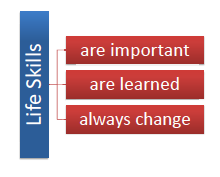Can you direct me where I could purchase or model a life skills group as you described on your website?
Thanks!!!
Joy Rediger
Shelter Plus Care Coordinator at Meridian Health Services
Muncie, IN
Thanks for your question. There are certainly programs that are available for sale that are aimed at teaching life skills, but most are aimed at school-children and likely won’t address the special needs of homeless individuals. There are several examples of good practices throughout Canada that are worthy of further investigation. Often, people in the sector are very willing to share their experiences to prevent colleagues from reinventing the wheel.
Here are a few that I found:
The Homeless Hub’s Communications Officer Oxana Roudenko and I recently visited Covenant House Toronto. Covenant House is Canada’s largest youth shelter and provides a wide variety of programs for their residents. The two that relate to your question are their job training program “Cooking for Life” and “Arts and Minds”, their mental health program. Both programs help equip youth with the skills that they need – both employment related skills and social skills – to survive in the world once they have left the shelter.
The Calgary Homeless Foundation is offering a workshop in March 2014 for service providers to teach them about providing life skills training to youth. Their event listing states that, “Today's youth are faced with a myriad of challenges on their path towards adulthood. It is therefore crucial that they develop the skills to deal with difficulties of the present, as well as become equipped to face the challenges of the future. The purpose of this workshop is to enhance the ability of staff to help youth develop skills and tools that will improve their self-esteem and help them manage life's difficulties. This high-energy workshop will take participants through numerous activities aimed at teaching these important life skills.”
Earlier this fall in Prince Rupert, BC, it was announced that Northwest Community College had “received approval from Service Canada and the Prince Rupert Aboriginal Community Services Society (PRACSS) to launch an innovative Life Skills Training program designed to mitigate homelessness and to assist persons at risk of becoming homeless in northwestern British Columbia.” Denise Henning, President and CEO of the college said, “This new program will enable participants to acquire skills that will assist them in their daily lives and also help them to engage more effectively in their communities through healthier lifestyles, improved self-confidence and self-image, and basic financial literacy.”

In Kamloops, BC, the Kamloops Homelessness Action Plan has prepared a full evaluation of their “Life Skills Development Project”. This project created an inventory of existing life skills programs that are already taking place in their community. I recommend this as a good first step for any community looking to develop their own life skills program. Even if a service isn’t geared towards providing support to people experiencing homelessness their program may be very adaptable. In the Kamloops report they stress the importance of life skills training. “Ending homelessness means people must stay housed, and maintaining housing requires Life Skills. From house cleaning, cooking & home maintenance, to self-esteem, emotional control & conflict resolution, the range of Life Skills necessary to achieve housing stability is complex. Life Skills Training is crucial to help people transition from homelessness and poverty to an empowered and independent life…Often, deficiency in these skills can lead to the loss of housing or the inability to attain sustainable housing. However, it is never too late to begin or resume learning these vital Life Skills. Access to training programs can assist those lacking basic Life Skills, specifically those at-risk of or experiencing homelessness, to develop the ability to independently manage their lives and thrive within society.”
Image from the Kamloops Homelessness Action Plan Life Skills Development Project Report.

